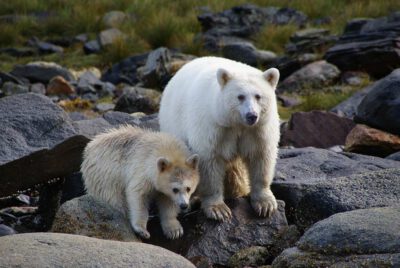
Bella Bella, British Columbia – On the heels of the coastal First Nations‘ declaration opposing the hunting of grizzly and black bears on the central and north coast of BC, Raincoast Conservation Foundation has now secured the commercial trophy hunting rights across a large portion of the Great Bear Rainforest. A new purchase, completed this week, abuts another exclusive guiding territory purchased by Raincoast in 2005, which was the first conservation acquisition of a guide outfitter territory in BC.
“With the purchase of this additional 3,500 sq km hunting license in the heart of Spirit Bear habitat, Raincoast now controls more than 28 thousand sq km of commercial hunting territory in the Great Bear Rainforest,” said Chris Genovali, Raincoast Executive Director. “Ecological issues aside, the coastal trophy bear hunt cannot be justified from either an ethical or economic perspective.”
“As guide outfitting territory owners in the Great Bear Rainforest, our intention has been to support the economic initiatives based on bear viewing in these coastal First Nations communities,” said Brian Falconer, Guide Outfitter Coordinator for Raincoast. “Accordingly, we have and will continue to manage our territories in consultation with coastal First Nations – no bears have been killed since the acquisition of these territories.”
Raincoast’s acquisition of the ‘Spirit Bear‘ guide outfitting tenure stops the commercial trophy hunting of the black bears that carry the gene responsible for producing the white bear. It also supports the burgeoning wildlife viewing initiatives being pursued by the Kitasoo/Xais-Xais and Gitga’at First Nations.
“Raincoast’s purchase of this territory supports the Kitasoo/Xais-Xais investment in sustainable eco-tourism jobs,” said Chief Councillor Doug Neasloss, who also serves as head guide at the beautiful Spirit Bear Lodge in Klemtu.
“The BC government and the trophy hunting lobby claim that the coastal bear hunt is based on science. The reality is it’s more science fiction than science,” said Raincoast senior scientist Dr Paul Paquet. “In the face of climate change, habitat fragmentation, salmon declines and threats of oil spills, the province’s faith-based wildlife management is unlikely to ensure the long term viability of coastal bear populations in the Great Bear Rainforest.”
“This is great news, from an economic and ethical standpoint,” said Kevin Smith, president of Maple Leaf Adventures, one of the many ecotourism companies that offer bear viewing in the Great Bear Rainforest. “This region has some of the world’s best bear viewing, and bear viewing provides far more economic benefit than trophy hunting coastal bears. We applaud Raincoast for their vision and drive to make this happen.”
Raincoast Conservation Foundation
www.raincoast.org








